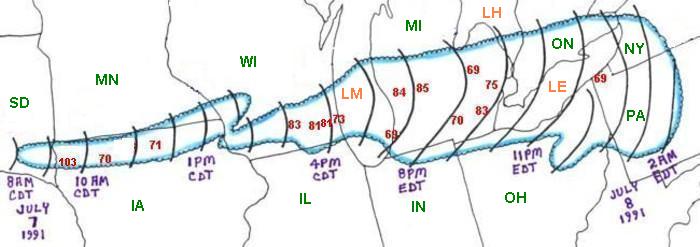JULY 7-8, 1991
DERECHO
"The Southern Great Lakes Derecho of 1991"

Figure 1. Area affected by the July 7-8, 1991 derecho (outlined in blue). Approximate hourly positions of the derecho gust front indicated by curved black lines. Measured wind gusts (in mph) in red.
During the early daylight hours of Sunday, July 7, 1991, a bow echo developed over southeast South Dakota and began racing east, producing very damaging winds. This was the start of a long-lived derecho that lasted 17 hours and affected areas from the Great Plains into western New York and Pennsylvania (Figure 1). Wind gusts in some places reached 80 to 100 mph. The strongest gust, 103 mph, was measured at Sioux Center, Iowa around mid-morning (Figure 1), and the roof of a school was blown off in nearby Orange City.
As the derecho storm system moved across northern Iowa, considerable damage occurred. Many thousands of acres of corn and soybean plants were flattened, resulting in crop losses of $60 million (1991 dollars). Many farm buildings were damaged or destroyed. A gust to 71 mph was measured at the Mason City Airport, and there was much damage in and near the city. In McIntosh Woods State Park, which is a few miles west of the Mason City Airport, a women was killed when a tree fell on her van and crushed it.
As the storm system entered Wisconsin early in the afternoon, the original bow echo that caused the damage west of the Mississippi River weakened and a new bow echo quickly formed to the south. This bow echo rapidly increased in size; by the time it reached Madison, it was producing severe and extensive damage. At Madison's Dane County Regional Airport, a gust to 83 mph was recorded and 20 buildings and hangers were damaged. Several airplanes were damaged or destroyed. In the Madison area, 60,000 customers lost electrical power, and damage totaled $7 million.
In a corridor from Madison to Lake Michigan just north of Milwaukee, very strong winds and intense damage continued to occur. At the Sullivan-Milwaukee NWS Forecast Office and at the Waukesha Airport, gusts to 81 mph were recorded. About 30 farm buildings were destroyed and over 250 were damaged in this area. Many homes and businesses were damaged, hundreds of trees were blown down, and many thousands of customers lost electrical power. Four people were injured. Besides Madison, some towns that received severe damage include Ixonia, Watertown, Milford, Waukesha, and Cedarburg. In Waukeska, the historic 300 year-old Dunbar Oak Tree was toppled, and at the airport, two planes were destroyed and hangers were damaged. The Federal Emergency Management Agency declared the counties of Dane, Jefferson, Waukesha, Washington, and Ozaukee as part of a Federal Disaster Area. The July 7-8, 1991 derecho caused a total of about $20 million worth of damage in Wisconsin, most of which occured in the Federal Disaster Area.
The derecho storm system crossed Lake Michigan and entered southwest Lower Michigan between 6 and 7 p.m. EDT Sunday evening. During the next three hours it raced across the state at a speed of 60 mph, causing much damage to buildings and crops, blowing down numerous trees, and cutting off electric power to 853,000 customers. This was the largest number of customers in Michigan to lose electrical power from one storm system to date. More than a week passed before electrical power was totally restored.
Some of the strongest winds occurred in Kent County and northwestern Ionia County, where a gust to 84 mph was measured in Grand Rapids and a gust to 85 mph was recorded at Belding. Some of the worst damage in southwest Lower Michigan also occurred in these counties. Two homes were destroyed and over 250 others were damaged. About four dozen barns were damaged or destroyed, and many fruit growers lost more than half their crop.
As the storm system continued east across the state, a semi-trailer truck was blown over on Interstate 69 east of Battle Creek. Some of the most severe damage in southeast Lower Michigan occurred from Shiawassee County east into the Flint metropolitan area. In New Lothrop, 10 mobile homes were blown over, with one being rolled into a nearby lake. In Durand, numerous camper trailers were blown over and one person was injured. Many homes and cars were damaged by falling trees in Owosso. A roof was blown off an elementary school in Swartz Creek, and on the west side on Flint near Interstate 75, roofs were blown off two apartment buildings.
Wind gusts from 75 to 85 mph were common in the Ann Arbor, Detroit, and Pontiac areas. Many homes and cars were damaged in Rochester and Tecumseh, and trees and power lines were blown down throughout the region.
After crossing Lower Michigan, the derecho entered southwest Ontario during the late evening. Many trees and electrical lines were blown down, and a number of roofs were damaged or blown off. Some of the worst affected towns included Harrow in Essex County, Chatham and Ridgetown in Kent County, and Strathroy in Middlesex County. The bow echo system and derecho winds then crossed Lake Erie and affected parts of northwest Pennsylvania and adjacent states before ending about 2 AM EDT Monday, July 8.
In summary, the "Southern Great Lakes Derecho of 1991" traveled about 1000 miles, caused $125 million worth of damage, produced widespread electrical outages that affected nearly one million customers, killed one person, and injured about a dozen others.
_____________________________________________________________________________
[Data and other information on July 7-8, 1991 derecho in Ontario were provided by Environment Canada meteorologists P. Chadwick and M. Leduc.]
Additional information:
Storm Data, July 1991
Back to Noteworthy Derechos list